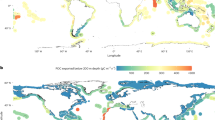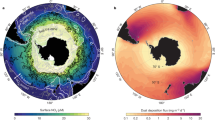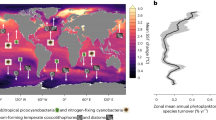Abstract
TAKEN together, Sugawara and Terada's experiment A and Johannesson's evidence form more cogent reasons for believing iodate to be the oxidized form of iodine in the sea than the reasons we presented for believing hypoiodous acid to be the oxidized form. However, as we indicated, the volatility of iodine from sea water seems to demand that a large part of the iodine should be in the form of hypoiodite. Unless the volatility can be explained quantitatively in terms of an iodate–iodide mixture, the state of iodine in the sea cannot be considered as satisfactorily settled.
This is a preview of subscription content, access via your institution
Access options
Subscribe to this journal
Receive 51 print issues and online access
$199.00 per year
only $3.90 per issue
Buy this article
- Purchase on Springer Link
- Instant access to full article PDF
Prices may be subject to local taxes which are calculated during checkout
Similar content being viewed by others
References
Sugawara, K., Proc. Regional Symposium on Physical Oceanography, Tokyo (Oct. 1955).
Suda, K., cited in “The Oceans”, by Sverdrup, H. U., Johnson, M. W., and Fleming, R. H., (Prentice-Hall, New York, 1942).
Author information
Authors and Affiliations
Rights and permissions
About this article
Cite this article
SHAW, T., COOPER, L. Oxidized Iodine in Sea Water. Nature 182, 251–252 (1958). https://doi.org/10.1038/182251b0
Issue Date:
DOI: https://doi.org/10.1038/182251b0
This article is cited by
-
Determination of iodate in rain-water
Journal of Radioanalytical Chemistry (1978)
Comments
By submitting a comment you agree to abide by our Terms and Community Guidelines. If you find something abusive or that does not comply with our terms or guidelines please flag it as inappropriate.



